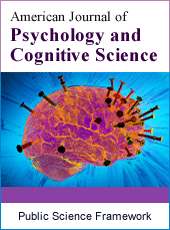American Journal of Psychology and Cognitive Science
Articles Information
American Journal of Psychology and Cognitive Science, Vol.4, No.3, Sep. 2018, Pub. Date: Jun. 14, 2018
Study of Meditational Role of Self-Esteem in the Relationship Between Perfectionism and Competitive Anxiety Elite Athletes
Pages: 26-30 Views: 2310 Downloads: 590
[01]
Maryam Lafata, Department of Psychology, Arsanjan Branch, Islamic Azad University, Arsanjan, Iran.
[02]
Ladan Hashemi, Department of Psychology, Arsanjan Branch, Islamic Azad University, Arsanjan, Iran.
[03]
Younes Mohammadzadeh, Department of Physical Education and Sports Sciences, Arsanjan Branch, Islamic Azad University, Arsanjan, Iran.
This study examined the mediating role of self-esteem in the relationship between perfectionism and competition anxiety. Participants included 246 elite athletes from Fars province. Participants Martinez Competitive Anxiety Inventory and the Excellence Questionnaire by Don and colleagues and completed the Rosenberg Self-Esteem Questionnaire. Cronbach's coefficient was used to check the validity of the instrument. The structural equation model was used to evaluate the proposed model, based on which self-esteem perfectionism was used to influence the anxiety of athletic competition. The results showed that elite athletes had a low self-esteem with negative perfection and experienced high competitive anxiety. The findings also indicated that self-esteem plays a mediator role in the relationship between perfectionism and competitive anxiety. The implications and uses of the findings were discussed.
Perfectionism, Competitive Anxiety, Self-Esteem, Elite Athletes
[01]
Berry, T. R., and Howe, B. L. (2000). "Risk factors for disordered eating in female university athletes". Journal of sport behavior, 2000, 23, PP: 207-219.
[02]
Dunn J. etal. (2005). Establishing construct validity evidence for the sport multidimensional perfectionism scale. Psycology of Sport and Exercise. 7, 1: PP. 57-79.
[03]
Hamachek, D. E. (1978). Psychodynamics of normal and neurotic perfectionism. Psychology, 15 (1), 27-33.
[04]
Frost, R. O., Turcotte, T. A., Heimberg, R. G., Mattia, J. I., Holt, C. S., & Hope, D. A. (1995). Reactions to mistakes among subjects high and low in perfectionistic concern over mistakes. Cognitive Therapy and Research, 19 (2), 195-205.
[05]
Hmidi and Besharat. (2010). Perfectionism and competitive anxiety in athletes. elsevier Procedia Social and Behavioral Sciences (2010) 813–817.
[06]
Hardy, L., Gones, G., & Gould, D. (1996). "Understanding psychological preparation for sport: Theory and practice of elite performers". New York: Wiley.
[07]
Holender, M. H. (1965). Perfectionism. Comprehensive Psychiatry, 6, 94-103.
[08]
Martens R., Vealy R. S., & Burton D. (1990). "Competitive anxiety in sport". Champaign, I. L: Human Kinetics.
[09]
Hardy, L., Gones, G., & Gould, D. (1996). "Understanding psychological preparation for sport: Theory and practice of elite performers". New York: Wiley.
[10]
Mehrabizadeh Honarmand, Mahnaz; Allameh Atefeh; Shahni Yeylagh, Manijeh. (2006). Relationship between self-respect, social anxiety, perfectionism and procrastination with academic performance and test anxiety. Journal of Psychology, Quarterly Journal of Iranian Society of Psychology, 11th Year, No. 3, pp. 242-255.
[11]
Wesley, J. C. (1994). Effects of ability, high school achievement, and procrastinatory behavior on college performance. Educational and Psychological Measurement, 54, 404–408.

ISSN Print: 2381-7453
ISSN Online: 2381-747X
Current Issue:
Vol. 6, Issue 2, June Submit a Manuscript Join Editorial Board Join Reviewer Team
ISSN Online: 2381-747X
Current Issue:
Vol. 6, Issue 2, June Submit a Manuscript Join Editorial Board Join Reviewer Team
| About This Journal |
| All Issues |
| Open Access |
| Indexing |
| Payment Information |
| Author Guidelines |
| Review Process |
| Publication Ethics |
| Editorial Board |
| Peer Reviewers |


